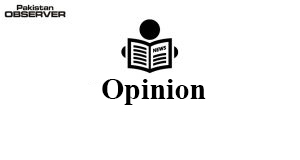Articles and letters may be edited for the purposes of clarity and space. They are published in good faith with a view to enlightening all the stakeholders. However, the contents of these writings may not necessarily match the views of the newspaper.
AML/CFT Regime
Economies with fragile framework of AML/CFT suffer from significant reputational risk, consequently it makes less attractive for foreign investors and donors to invest in these economies. Since Pakistan has a history of having in the watch-list and recently, he has been there since June 2018 and hope to get out of grey list in coming session, but this unpredictable behaviour towards AML/CFT Regulations discourages foreign investors to invest in such type of economies. On the other hand, donors also hesitate to donate in such countries due to strict laws, lots of documentation and misuse of funds. Therefore, Government of Pakistan had formulated certain strict rules and regulations for financial institutions to eliminate money laundering from the country.
Pakistan is a developing country and 100 million people are not using financial services due to low income. In this situation, micro-finance institutions play an important role to eliminate poverty and help in job creation by providing small loans to the low-income people at lower rates. But there are certain government policies regarding AML/CFT that are creating hurdles in serving the needy ones. People hesitate to use micro-finance products due to lots of documentation, scrutiny, source of income and fear of being investigated that restricted them to fully utilize micro-finance products. Moreover, it also increases the cost of financial institutions to comply with such rules and regulations that ultimately affect the growth of the sector.
In Findex Report, it was pointed out that one of the reasons of not using financial services in developing countries by low-income people is that they cannot fulfil the documentary requirements of the institutions. As there are least chances of money laundering in micro-finance, therefore, government should ease documentary requirements and other restrictions on micro-finance institutions and facilitate donors that help micro-finance sector for sustainable development. This will help micro-finance institutions to get maximum market shares like other financial institutions.
JAHANZAIB ASHIQ SATTI
Islamabad
BCS
,
Body Condition Score (BCS) is a subjective assessment of body fat reserves in a dairy cow. It is now well established that the BCS at calving and the change in BCS after parturition are associated with productivity, reproduction and health status in dairy cows. However, relatively a few studies have investigated the impact of BCS on performance in buffaloes. As buffaloes produce more fat in milk, it becomes even more important to assess the impact of calving BCS in dairy buffaloes.
A PhD study conducted at the University of Veterinary and Animal Sciences Lahore (UVA), revealed that the buffaloes with medium BCS (fat reserves) at the time of parturition produced more fat in the milk compared to the buffaloes with low and the high BCS. These buffaloes were followed throughout the subsequent lactation to observe the reproductive performance. The results showed that the buffaloes with medium BCS at calving appeared to have better reproductive performance compared to the low and the high BCS.
The buffaloes in medium BCS group had fewer days to first oestrous, lower services per conception, and fewer days open compared to the low BCS group. The study also evaluated the effectiveness of the 5-point Elanco BCS system when applied to dairy buffaloes. When different assessors applied the BCS system to buffaloes they had had substantial agreement for assessment and repeatability when applied to buffaloes. The Elanco BCS system is simple and user friendly, as it is entirely based on visual assessment and relatively fewer body parts are observed for scoring.
SAYYAD HUSSAIN MAGSI
Lahore
Pakistan seeks stability in Afghanistan
Pakistan-Afghanistan relations involve bilateral relations between both countries. The two neighbouring Asian states share deep historical and cultural links; each has declared itself an Islamic republic and both have become members of the South Asian Association for Regional cooperation. Relations between the two countries have been strained since 1947, when Pakistan first formed and Afghanistan was the sole country to vote against Pakistan’s admission into the UN.
Pakistan seeks stability in Afghanistan which is not possible owing to Indian presence there. Hence, Pakistan has legitimate concerns in Afghanistan. So, by showing realistic approach, the US and other western countries should realize that unlike India, Pakistan shares common geographical, historical, religious and cultural bonds with Afghanistan, while Pak-Afghan stability is inter-related, which is also essential for their global and regional interests.
Restoring complete peace is a lengthy process but it becomes lengthier when a country shares the porous border with a neighbouring state where, there is no state authority at all. It is said that “good fences make good neighbours”. And it is really true in the case of Pak-Afghan border management. Management of Pak-Afghan Border is the dire need of time for long lasting peace not only in Pakistan but also in the entire Afghanistan.
Pakistan is a peace-loving country and still continues to play its positive role in bringing about enduring peace and stability in the region. Pakistan is playing its positive role and is ready to work closely with Afghanistan. Pakistan’s willingness to resolve issue of infiltration across the Pak-Afghan border, terrorism and to invest in development of social sector like health and education in Afghanistan shows its peaceful diplomacy because peace is benefited both countries.
M ZEESHAN CHOUDHARI
Islamabad










